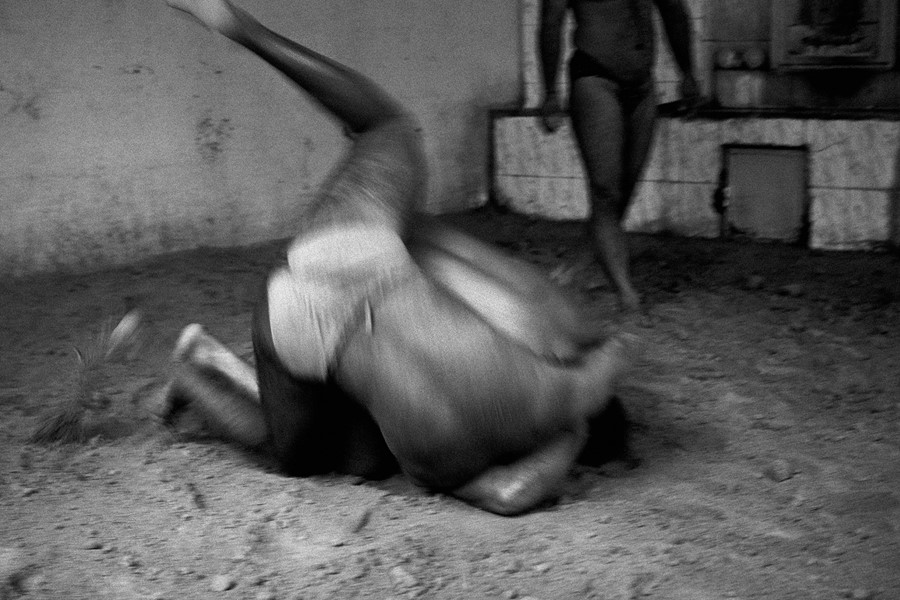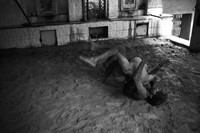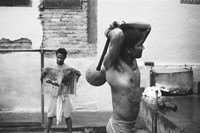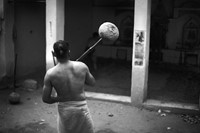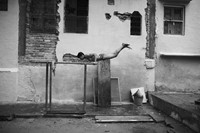Being sold to raise funds for India’s Covid-19 crisis, Douglas Irvine’s new photo book shines a light on an akhara – where kushti is traditionally practiced – located in Varanasi, India
“I actually came to this project by accident,” says photographer Douglas Irvine of his latest project, a book titled Akhara which shines a light on just that, an akhara, located in Varanasi, India. Akharas, for the uninitiated, are the buildings where kushti or pehlwani, a centuries-old form of wrestling, is practiced.
A regular contributor to AnOther Magazine, Irvine stumbled upon an akhara by chance, when he was on holiday in Varanasi and struggling to find his way back to the place he was staying. And while it’s a far cry from his usual subjects, he immediately decided to photograph the building and the people who practice within it – partly out of curiosity and partly out of a desire to preserve this fascinating culture, which is sadly on the decline.
Akhara started out as a personal, private project, but as the Covid-19 pandemic ravaged through India, Irvine felt prompted to take it public, in the form of a special photo book, sold to raise funds for charities helping to combat the crisis. Here, Irvine tells the story behind this publication.
“I was on holiday in Varanasi, which is an incredible place but easy to get lost in. I pretty much walked right into this akhara when I was trying to find my way back to the place I was staying. I came back the very next day and everyone was so happy to have me come take some photos. I helped them keep the place alive a little longer. They needed some building work done, so I helped them get a new toilet which was needed to keep the place open.
“Kushti is a form of wrestling that has been practised in India since the 16th century. These akharas are really magical places – this one was so pleasing to photograph. All the equipment is handmade and the space itself was a complete contrast to the city just outside the walls. So peaceful. To me, the whole process of practising kushti seems like practising Buddhism, both physically and mentally. The language is certainly shared – for example, the word ‘akhara’ is also used to denote a religious temple.
“This particular akhara was on the brink of closing down. I read about how an increase in alcohol consumption among young people in India (which doesn’t sit well with the practice) was contributing to the decline in the sport. Meanwhile modern gyms – like the ones we might see here in the west – are becoming increasingly more popular there. I felt it was important to document it before it was gone.
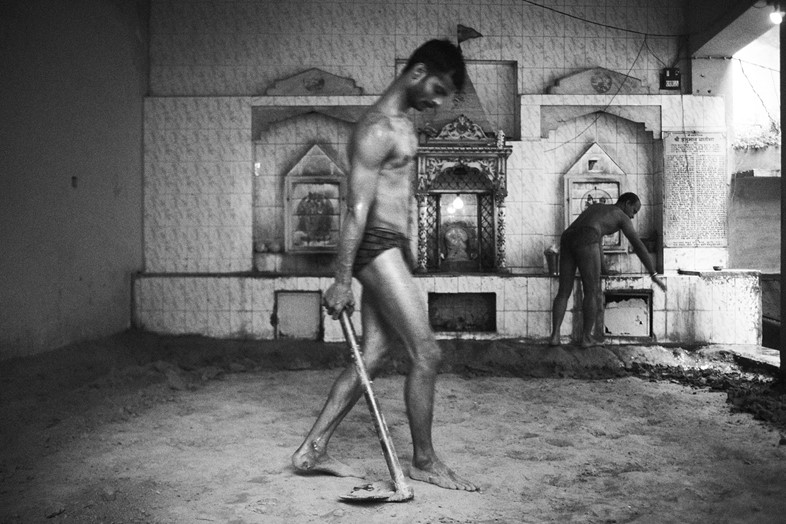
“When I first started making a book out of the pictures it was a personal endeavour, I didn’t plan on publishing it, so I was in no rush. It was nice to be able to take my time. I have always been a big fan of Japanese photobooks – the design and print techniques of 60s and 70s Japanese photography books (Provoke is a good start) are something that have been and remain a big influence for me – I think it might show in this book! Having the time and freedom to figure out the paper I wanted to use and how I felt the pictures should be worked up is a privilege I don’t often get at the moment. I shot this project on film and printed them myself before having it reproduced on a digital press and hand-bound by FE BURMAN. The print that comes with each copy is hand-printed by me.
“The Covid-19 crisis in India has become extremely bad, and if releasing this book can help at all, then I think it’d be terrible not to. I’ve donated prints to as many of the charity organisations as I can to help, too. Creative Seva, Art for India and PhotoBookCafe in London are all helping and have so many great prints available to buy. I am splitting the proceeds from this book between three charities that are directly helping with the Covid-19 crisis. There are certainly other charities helping however I felt these three were ‘on the ground’ for lack of a better way to describe it.
“I hope the book is well received! I like to think that I have made something that is pleasing to look at, somewhat informative from a cultural point of view and also helping a cause.”
Akhara by Douglas Irvine is out now via Claire de Rouen, Donlon Books, Yvon Lambert and akhara.store. Proceeds from the book will be donated to Oxfam India, Indian Red Cross and Mission Oxygen.
